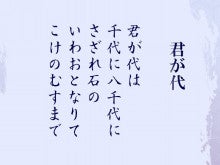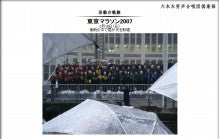一昨日は、多くのアメリカ人も今後は錦織圭選手のファンになるだろうという話をしました。私はだいぶ前から彼のファンでしたが、今回改めて好きになり、今後ますます応援したいと思いました。
The day before yesterday I posted that great numbers of Americans are becoming fans of Kei Nishikori. I have been a fan of his for some time. And with his latest performance, my interest in his tennis has increased even more.

http://blogs.yahoo.co.jp/satomimasamichi/25115172.html
ところで、あなたはなぜ錦織選手を応援するのでしょうか。テニスにほとんど興味がなかった人も、今回の快挙には熱くなったと思います。彼のプレーが素晴らしいからですか? それとも彼のキャラクターが素晴らしいからですか? もちろん、それらも錦織選手を応援したくなる理由の一つかも知れませんね。
Are you a Nishikori supporter? I think that a large number of people who don’t have that much interest in tennis took great interest in his brilliant feat. Is that because he played so well? Or is it because he has such an oustanding character? Of course, these are good reasons for wanting to root for Nishikori.
http://blog.goo.ne.jp/inoribito_001/e/c0a019e86a49dc2dc4f1f6973620d03c
しかし最大の理由は、錦織選手が日本人であり、あなたも日本人だからではありませんか? オリンピックやサッカーのワールドカップ、世界陸上などでも、当たり前のように日本代表を応援するのはなぜですか? それもきっと同じ理由ですよね。

http://sportiva.shueisha.co.jp/clm/othersports/2012/02/18/post_98/
However, I suspect that the biggest reason was because Nishikori is Japanese and you are Japanese. You routinely cheer on your Japanese athletes in the Olympics, the soccer World Cup, or the world track and field championships. I suspect you do that for the same reason.

http://blog.livedoor.jp/nabe_masa07082/archives/52035022.html#more
日本人が世界の大舞台で活躍すると「同じ日本人だから」という理由だけで嬉しくて、誇らしい気持ちになりますよね。それこそが健全な「愛国心」の現れだと私は思います。愛国心という言葉に強いアレルギー反応を示す日本人が意外と多いのですが、「愛国心=右翼=軍国主義=ファシズム」のような刷り込みが、よほど強いのでしょうね。
When Japanese people turn in great performances on these world stages, as a fellow citizen of Japan it gives you joy, and you feel a great sense of pride. I think that is a healthy expression of “patriotism.” However, there are surprisingly large numbers of Japanese people who exhibit a severe allergic reaction to the word “patriotism.” They have a strong preconception that Patriotism = Right Wing = Militarism = Fascism.
http://momolunafever.blog64.fc2.com/blog-entry-1483.html
オリンピックなどのスポーツイベントをはじめとして、様々な国際大会の表彰式では、優勝者の母国の国旗を掲揚し、国歌も流すことが頻繁にあります。だから日本代表選手はよくインタビューで「日の丸を背負う重みを感じます」とか「表彰式で君が代を聞きたいです」などと答えますよね。
In the awards ceremonies at the Olympics and other international sports events, the national flag for the winner’s country is displayed, and the national anthem is played. Athletes often comment in interviews that “I feel the weight of the national flag” or “I want to hear Kimigayo (the national anthem) played at the awards ceremony.”
要するに国旗や国歌というものは、国家の象徴であり、その国に属する人々の愛国心の象徴です。だからこそ国旗や国歌は、自国のものであっても、他国のものであっても、誰もが無条件で大切に扱うべき存在だと私は考えます。それを無視したり、軽んじたり、増してや国旗を踏みにじったり、燃やしたりする人々は、周囲の人に「軽蔑」以外の何を求めているのでしょうか。国歌斉唱時に脱帽や起立しない人々も同様だと私は思います。まあ「歌に自信が無いから一緒に歌えない」という人は許せますけど。
In other words, the national flag and the national anthem are symbols of the nation, and symbols of the patriotism or national pride of the citizens of those countries. For this reason, I think it is important that the flag and national anthem of one’s own country and that of other countries be treated as something to be respected without reservation. People who ignore, treat lightly, or for that matter tread upon or burn the flag of other countries invite nothing but scorn. I think the same applies to people who do not take off their hats or stand for the national anthem. That being said, I think we can excuse people who say “I don’t have a good voice, so I won’t join in the singing.”
第82回選抜高校野球大会 国歌独唱:http://youtu.be/wKCk11jfL8g?t=14s

ちなみに私はアメリカ人ですが「君が代」を歌えますよ。六本木男声合唱団倶楽部の一員として、東京マラソンの開会セレモニーで何度も国歌斉唱をしています。ですから最近は「君が代」を歌えない日本人が珍しくないという話を聞いたときは驚きました。義務教育期間中に「君が代」を教えない地域が意外と多いのだそうです。その地域の教育委員会や校長は「国歌を歌えない日本人」を意図的に育てているとしか思えません。そのような校長や教育委員は、国が行う義務教育の意義を再考すべきです。
I am an American, but I can sing Kimigayo. As a member of the Roppongi Men’s Chorus Club, I have sung this anthem many times at the opening of the Tokyo Marathon. Perhaps that is why I am surprised when I hear that of late it is not unusual for Japanese to be unable to sing Kimigayo. I understand that there are a surprisingly great many areas where Kimigayo is not taught in the schools. I can only think that the members of the school board or the principals of the schools involved are deliberately trying to raise up a generation which cannot sing the national anthem. I would hope that these principals or members of the school board would rethink compulsory education.
http://www.rokudanku.com/kiseki20070218.html
私たちが東京マラソンで最初に「君が代」を歌った時、その生中継で、肝心の場面は放送されませんでした。なんで?(笑) アメリカでは大きなイベントの時は必ず開会セレモニーがあり、その中で国歌の斉唱もしくは独唱と、星条旗の掲揚は必要不可欠です。もちろんその場面もテレビで放送されますよ。だから東京マラソンの時は、六本木男声合唱団倶楽部という大人の団体が、せっかく100人規模で集合して「君が代斉唱」をしたのだから、テレビでも生中継して欲しかったです。そう言えば、東京マラソンの提唱者であり、有名なナショナリストである石原慎太郎元都知事が、これをやらせなかったのは不思議です。
After the first time, I realized that our singing of Kimigayo was not included in the live broadcast of the Tokyo Marathon. Why not? In the United States, the opening ceremony of such big events always includes the hoisting of the stars and stripes and the singing of the national anthem. And of course that is part of the broadcast. That’s why when a group of over 100 mature members of the Roppongi Men’s Chorus Club gather to sing Kimigayo at the start of the Tokyo Marathon, I would really like to see it broadcast live. In fact, thinking back, it seems strange that Shintaro Ishihara, the former governor of Tokyo, the founder of the Tokyo Marathon, and an avowed nationalist, did not cause this to happen.
さて、これまた伝聞情報で申し訳ないのですが、東京大学などいくつかのメジャーな国立大学では、卒業式で「日の丸」や「君が代」を一切使わないのだそうです。もちろん日本の「最高学府」の判断ですから、何か深い考えがあってのことでしょうが、国の税金をたくさん使って運営される国立大学が、重要なセレモニーの際に、国旗や国歌を一切使わない理由を、私はじっくり聞いてみたいです。
This is hearsay, but apparently Tokyo University and some other major national universities do not display the national flag or sing the national anthem at their graduation ceremonies. Of course these top educational institutions probably have some deep philosophical reasoning for this decision, but as national universities supported by national taxes, I would like to hear a reasoned explanation for why they refuse to use the flag or the anthem.
先に言っておきますけど、ネット上で噂されている「留学生に配慮して…」なんてのは全く理由になりませんよ。国立大学で学ぶ留学生は、祖国にいたままでは習得不可能な高度知識やノウハウを、日本の税金のお陰で勉強させてもらえるのだから、逆に日本という国家や国民に対して、最大限の「配慮」と「感謝」をするべき立場です。要するに大学側から「意味不明な配慮」をされるべき対象ではありません。
On the internet, it is said that this is as an accommodation to the large number of foreign students, but this is nonsense. Foreign students studying at national universities are acquiring advanced knowledge and knowhow not available at the universities in their home countries, and this study is made possible by Japanese taxes. Thus, these students should harbor high respect and gratitude to the Japanese nation and Japanese people. In other words, they are not worthy recipients of such meaningless gestures by the universities.
私がもし、それらの国立大学の学長なら「日の丸と君が代が嫌いなら、我が大学に入学するな! いや、そもそも日本に来るな!」と留学生に言うでしょうね。もちろん、私の言動に反対する教員には「だったら国公立学校の教師や教授になるな!」と言います。だって税金から給料・補助金を貰いつつ反日教育を行うような教師や学校を許すなんて、日本人は「お人よしにも程がある」のではありませんか?
If I were the president of a national university, I would say to foreign students “If you don’t want to see the national flag and hear the national anthem, then don’t study at our university.” To teachers who opposed my actions, I would say “Then don’t become a teacher or a professor at a national or public university.” After all, shouldn’t there be a limit to how much can be tolerated from teachers or schools which engage in anti-Japanese education while being supported by national taxes and subsidies?
もちろん、日本という国には改善すべき点がたくさんあると思いますが、少なくとも国旗や国歌に敬意を払わない教師や学校は、国家の伝統やルールを軽視もしくは無視しているのだから、国や自治体の「改善」ではなく、「革命」をやりたい人々ですよ。そのような人や組織に国の将来を担う子供たちを教育させるなんて、自殺行為です。
Of course there are many things about Japan which need to be improved, but if teachers and schools cannot show respect for the national flag and national anthem, then they are discounting or ignoring the rules and traditions of the nation. They are promoting not “improvement” but “revolution.” It is suicidal to be entrusting the education of the children who will support our future to such people and institutions.
日本国憲法が保障する「幸福追求権」や「表現の自由」、「生存権」などの基本的人権の中に、「国家転覆の自由」という権利は保障されていなかったと記憶していますが、私の勉強不足だったかな?
Among the basic human rights guaranteed by the Constitution such as the right to the pursuit of happiness, freedom of expression, and right to life, I do not recall seeing the “freedom to overthrow the country.” Am I missing some important point here?





